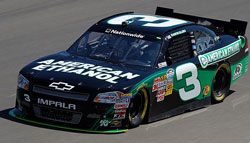By
David Lee Smith
|
More Articles
March 7, 2012
I'd been ruminating for several days about a
Wall Street Journal editorial
taking issue with the proposed Nat Gas Act, when this week the financial-0news icon trumpeted the information that Chrysler
and General Motors (
NYSE: GM )
are about to offer pickup trucks powered by natural gas. The
announcement came at a time when motorists are feeling progressively
pump-pinched as gasoline prices move to -- and in some cases above --
the $4.00-per-gallon inflection point where they noticeably affect the
economy.
Chrysler, which is controlled by Italy's Fiat, will manufacture
production-line pickups that run on natural gas, along with bi-fuel
trucks that will be powered by a combination of compressed natural gas
and gasoline. In GM's case, it will manufacture bi-fuel trucks beginning
in the last quarter of this year. Once the company has produced the
trucks, they will be sent to an outside source for retrofitting to
facilitate natural gas usage. The planned vehicles will join the
compressed natural gas units that
Ford (
NYSE: F ) has manufactured -- with their tanks added externally -- for a couple of years.
We had almost forgotten how to spell "bipartisan."Given
the substantial increases in gas reserves that our nation's producers
have added through technological advancements that have led to output
from unconventional plays, the automakers' news has to be considered a
sensible advancement. That still leaves the
Journal's
consternation over the Nat Gas Act, a measure with the bipartisan
support of 180 House "parents," including six dozen Republicans, along
with a trio of senators, including Majority Leader Harry Reid, Democrat
Robert Menendez of New Jersey, and North Carolina Republican Richard
Burr.
However, the paper clearly has saved its sharpest approbation for Dallas oilman and energy seer
T. Boone Pickens,
hence the piece's "Boone-Doggle" headline. Pickens is an avowedly
strong advocate of the act's potential to push the expansion of natural
gas as a transportation fuel. Possibly, along with the proposed act's
design -- which would , as they phrase it, "dun taxpayers" -- the
Journal's editors are likely put off by Pickens' nearly 30% ownership in
Clean Energy Fuels (
Nasdaq: CLNE ) , a manufacturer of natural gas equipment for refueling cars and trucks.
You're beautiful and you're mineBut it'd be
strange if Boone -- I can call him that; I've met him -- were to oppose
the heightened expansion of natural gas as a transportation fuel. As the
onetime Oklahoma geologist has said for years, "Natural gas is cheap,
clean, [and] abundant, and it's ours." So let's take a gander at the key
provisions in the act to see whether we can locate realistic rubs.
Perhaps then we'll be compelled to add some of our own rarely tentative
observations:
Under the act, truck owners, from 18-wheelers to light delivery models would receive tax credits
running all the way from $7,500 to $65,000 for the conversion of each
vehicle to natural gas-burning capability. Further, there's a provision
for a $0.50 per gallon credit for natural gas purchases during the next
four years, and service stations would become beneficiaries of $100,000
tax credits for adding natural gas dispensing capabilities. According to
the Journal, an average tax credit of $15,000 for each of the
eight million trucks in the current U.S. fleet would set taxpayers back
by more than $100 billion, not the $5 billion in the course of five
years that advocates allege.
My recommendation is that both the bill's sponsors and the
Journal
editors rethink their numbers. Beginning with the top end of the truck
owners' rebate, $65,000 appears to be, well, highway robbery. With gas
currently costing as little as half of oil per gallon, and admittedly
taking only a stab at a seemingly logical amount, high-end tax credits
of, say, $25,000 would appear to meaningfully initiate the payback,
which would then be enhanced by every gallon of natural gas burned, in
the process lowering the editors' $15,000 average multiplier.
Oldsters need not applyAnd then, we're
presumably not drunken sailors -- itself a horrific notion, given my
Marine Corps stint -- so let's not get carried away by tossing
rebates at all trucks.
The clear objective here is to begin to build a natural gas-as-a-fuel
movement that, once it's taken root, will logically expand on its own.
So perhaps credits should be awarded only for the top third of newest
trucks, logically calculated by beginning with models from a relatively
recent year -- thereby eliminating the editors' absurd notion of
covering the entire 8 million-vehicle national fleet. After all, why
provide taxpayer largesse for, say, a 10-year-old 18-wheeler that is
bearing down on its final years of plying the highways?
As the editors further note, ethanol was sold as a way to
achieve energy "security," but after three decades and layouts in excess
of $40 billion, it still requires government support. And despite the
two-decade federal bolstering of such renewable fuels as solar, wind,
and other non-hydro renewable fuels, to which tens of billions have been
appropriated, they collectively still account for just 3.6% of U.S.
electricity.
That's unfortunately been the track record for those programs, but as I
noted to Fools just last week, natural gas is a proven transportation fuel in many far less technologically advanced countries than our own.
Yet another positionWriting in
The Washington Times the day following the appearance of "Boone-Doggle," longtime conservative writer and
American Spectator founder R. Emmett Tyrell Jr. took a stab at the
Journal editors for their omission of a powerful inducement for passage of the Nat Gas Act:
The way to justify the Nat Gas Act is via national security. ...
America is vulnerable to terrorists, Middle Eastern instability, and
unfriendly powers around the world. We have a kind of miracle that has
been developed over the past few years, natural gas. By passing the Nat
gas Act now we can end these threats against us. We can become an energy
exporter.
My Foolish friends will recognize from my past writings that I'm in
complete agreement with Terrell and, by extension, Boone Pickens. I
don't judge it to be hyperbole to warn that we can consider ourselves
fortunate if we're able to dodge involvement in another geopolitical
conflict during the next year. An all-hands-on-deck effort to implement
the Nat Gas Act would at least nudge us toward seeing our own protection
-- military and financial.
The power of arbitrageFinally, there is one key consideration that neither the typically spot-on
Journal
editors nor Terrell has touched upon: Our nation's natural gas prices
have recently been trading in the nearly moribund vicinity of $2.50 per
million British thermal units. That's resulted in a cutback in gas
production at
Chesapeake Energy (
NYSE: CHK )
, and more recently other companies. Conversely, our Japanese brethren
must cough up about $16 for their imported liquefied natural gas.
But as my Foolish colleague
Amitabha Chakraborty has told you,
Cheniere Energy (
AMEX: LNG )
could have the U.S. participating in the liquefaction game with
shipments from Louisiana's Sabine Pass by 2015. I thereby smell a price
arbitrage
effect entering the global natural gas pricing picture. That could
alter even Boone's best laid gas-as-a-transportation-fuel plans
dramatically. Stay tuned,

 The
The 
